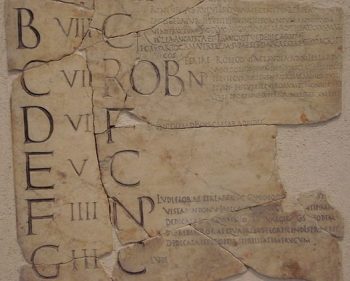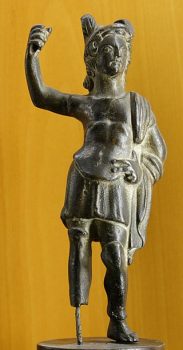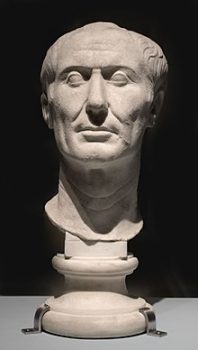Roman Months Posted by Brittany Britanniae on Sep 23, 2019 in Latin Language, Roman culture
Salvete Omnes,
Recently, I was having a conversation with my husband about the months of the year and the days of the week. While the days of week are more Germanic in nature (for English at least), the months of the year have a very interesting history. So, let’s dive in.
The Roman calendar used a system of months, and special days in each month. Some calendars were carved in marble or stone, but many were painted on walls for decoration.
In 45 B.C.E., Romans modified their method of marking time to keep it in phase with season. Eventually, they accomplished the Julian Calendar. Month lengths were extended to bring the calendar’s total to 365 days, making it truly solar. This change was accompanied by addition of an extra day every fourth year (after February 23rd) because of the almost six extra hours beyond 365 days in a tropical year.
Much of the knowledge we now have about early Roman calendars came from Ovid’s Fasti, a Roman born in 43 B.C.E., and from Plutarch, a Greek biographer who wrote between C.E. 105 and 115.
Initially, it contained only ten months. It has been suggested that those month lengths reflected growth cycles of crops and cattle. When compared with the solar year, it had an uncounted winter period of approximately sixty days.
| Months in the Republican Calendar (Common Year) |
|
|---|---|
| Month Names | Number of Days |
| Januarius | 29 |
| Februarius | 28 |
| Martius | 31 |
| Aprilis | 29 |
| Maius | 31 |
| Iunius | 29 |
| Quintilis | 31 |
| Sextilis | 29 |
| September | 29 |
| October | 31 |
| November | 29 |
| December | 29 |
As you can see from the chart above, that many of the months we will still use today are from Ancient Rome.
January — Janus’s month
ETYMOLOGY: Middle English Januarie
Latin Januarius “of Janus”
Latin Janu(s) “Janus” + –arius “ary (pertaining to)”
Latin Januarius mensis “month of Janus”
BACKGROUND: Janus is the Roman god of gates and doorways, depicted with two faces looking in opposite directions. His festival month is January. Januarius had 29 days, until Julius when it became 31 days long. There was also disagreement in Ovid’s day as to the sequence and time at which Januarius ( and Februarius) were added to the original ten months. Januarius became part of the calendar within half a century after Rome was founded because Plutarch said that Numa, the king who followed Romulus, made it the first month of the year and made February the last.
February — month of Februa
ETYMOLOGY: Middle English Februarius
Latin Februarius “of Februa”
Latin Februa(s) “Februa” + –arius “ary (pertaining to)”
Latin Februarius mensis “month of Februa”
Latin dies februatus “day of purification”
BACKGROUND: Februarius had 28 days, until circa 450 BC when it had 23 or 24 days on some of every second year, until Julius when it had 29 days on every fourth year and 28 days otherwise. Also, adding five days at year-end (to extend February’s length to 28) is similar to the change made by many other peoples who, around the time of Rome’s founding, added five days to their own calendar, but considered them to be unlucky and not part of the normal year.Februa is the Roman festival of purification, held on February fifteenth. It is possibly of Sabine origin.
March — Mars’ month
ETYMOLOGY:Middle English March(e)
Anglo-French March(e)
Old English Martius
Latin Martius “of Mars”
Latin Marti(s) “Mars” + –us (adj. suffix)
Latin Martius mensis “month of Mars”
BACKGROUND: Martius has always had 31 days.March was the original beginning of the year, and the time for the resumption of war. Mars is the Roman god of war. He is identified with the Greek god Ares.
April — Aphrodite’s month
ETYMOLOGY:Old English April(is)
Latin Aprilis
Etruscan Apru
Greek Aphro, short for Aphrodite.
BACKGROUND: Aprilis had 30 days, until Numa when it had 29 days, until Julius when it became 30 days long. According to Ovid, April was sacred to Venus, and her festival – the Festum Veneris and Fortuna Virilis – occurred on the first day of this month.” Apparently Aprilis stems from aphrilis, corrupted from Aphrodite, a Greek name for Venus.
May — Maia’s month
ETYMOLOGY:Old French Mai
Old English Maius
Latin Maius “of Maia”
Latin Maius mensis “month of Maia”
BACKGROUND: Maius has always had 31 days.Maia (meaning “the great one”) is the Italic goddess of spring, the daughter of Faunus, and wife of Vulcan. Maius was said by some to be named after the goddess Maia, a daughter of Atlas, and Junius “is indirectly named after the goddess Juno, the Roman equivalent of Frigga.
June — Juno’s month
ETYMOLOGY:Middle English jun(e)
Old French juin
Old English junius
Latin Junius “of Juno”
Latin Junius mensis “month of Juno”
BACKGROUND: Junius had 30 days, until Numa when it had 29 days, until Julius when it became 30 days long.Juno is the principle goddess of the Roman Pantheon. She is the goddess of marriage and the well-being of women. She is the wife and sister of Jupiter. She is identified with the Greek goddess Hera.
July — Julius Caesar’s month
ETYMOLOGY:Middle English Julie
Latin Julius “Julius”
Latin Julius mensis “month of Julius”
Latin quintilis mensis “fifth month”
BACKGROUND: Quintilis (and later Julius) has always had 31 days. Julius Caesar reformed the Roman calendar (hence the Julian calendar) in 46 BC. In the process, he renamed this month after himself.
August — Augustus Caesar’s month
ETYMOLOGY:Latin Augustus “Augustus”
Latin Augustus mensis “month of Augustus”
Latin sextilis mensis “sixth month”
BACKGROUND: Sextilis had 30 days, until Numa when it had 29 days, until Julius when it became 31 days long. Augustus Caesar clarified and completed the calendar reform of Julius Caesar. In the process, he also renamed this month after himself.
September — the seventh month
ETYMOLOGY:Middle English septembre
Latin September
Latin septem “seven” + -ber (adj. suffix)
Latin september mensis “seventh month”
BACKGROUND:September had 30 days, until Numa when it had 29 days, until Julius when it became 30 days long.
October — the eighth month
ETYMOLOGY:Middle English octobre
Latin October
Latin octo “eight” + -ber (adj. suffix)
Latin october mensis “eighth month”
BACKGROUND:October has always had 31 days.
November — the nineth month
ETYMOLOGY:Middle English Novembre
Latin November
Latin Novembris mensis “nineth month”
BACKGROUND:Novembris had 30 days, until Numa when it had 29 days, until Julius when it became 30 days long.
December — the tenth month
ETYMOLOGY:Middle English decembre
Old French decembre
Latin december “tenth month”
Latin decem “ten” + -ber (adj. suffix)
BACKGROUND:December had 30 days, until Numa when it had 29 days, until Julius when it became 31 days long.
Intercalaris — inter-calendar month
ETYMOLOGY:Latin Intercalaris “inter-calendar”
Latin Mercedonius (popular name) “?”
BACKGROUND: Intercalaris had 27 days until the month was abolished by Julius Caesar. It theoretically occurred every two (or occasionally three) years, but was sometimes avoided or employed by the Roman pontiffs for political reasons regardless of the state of the solar year. It was also known as Mercedonius meaning “Work Month” in Latin.
Well, I hope this helps with any future conversations or debates regarding the months of the year.

Build vocabulary, practice pronunciation, and more with Transparent Language Online. Available anytime, anywhere, on any device.










Comments:
A G Maxwell:
Gratias. Summa cum laude.